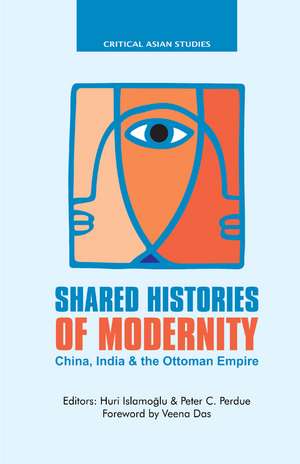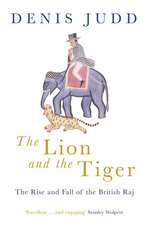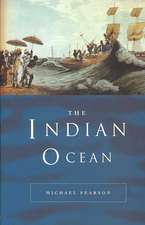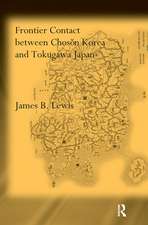Shared Histories of Modernity: China, India and the Ottoman Empire: Critical Asian Studies
Editat de Huri Islamoglu, Peter C. Perdueen Limba Engleză Paperback – 14 iun 2019
| Toate formatele și edițiile | Preț | Express |
|---|---|---|
| Paperback (1) | 318.95 lei 6-8 săpt. | |
| Taylor & Francis – 14 iun 2019 | 318.95 lei 6-8 săpt. | |
| Hardback (1) | 1002.63 lei 6-8 săpt. | |
| Taylor & Francis – 25 mar 2009 | 1002.63 lei 6-8 săpt. |
Preț: 318.95 lei
Nou
Puncte Express: 478
Preț estimativ în valută:
61.04€ • 63.49$ • 50.39£
61.04€ • 63.49$ • 50.39£
Carte tipărită la comandă
Livrare economică 14-28 aprilie
Preluare comenzi: 021 569.72.76
Specificații
ISBN-13: 9780367176341
ISBN-10: 0367176343
Pagini: 348
Dimensiuni: 138 x 216 x 22 mm
Greutate: 0.45 kg
Ediția:1
Editura: Taylor & Francis
Colecția Routledge India
Seria Critical Asian Studies
Locul publicării:Oxford, United Kingdom
ISBN-10: 0367176343
Pagini: 348
Dimensiuni: 138 x 216 x 22 mm
Greutate: 0.45 kg
Ediția:1
Editura: Taylor & Francis
Colecția Routledge India
Seria Critical Asian Studies
Locul publicării:Oxford, United Kingdom
Public țintă
PostgraduateCuprins
1. Introduction by Huri Islamoglu and Peter C. Perdue 2. Empire and Nation in Comparitive Perspective: Frontier Administration in Eighteenth-Century China by Peter C. Perdue 3. Administrative Practice between Religious Law (Shari'a) and State Law (Kanun) on the Eastern Frontiers of the Ottoman Empire by Dina Rizk Khoury 4. Administering the City, Policing Commerce by Peter Carroll 5. Heaven and the Administration of Things: Some Remarks on Law in the Tanzimat Era by Serif Mardin 6. A World Made Simple: Law and Property in the Ottoman and Qing Empires by Melissa Macauley 7. Modernities Compared: State Transformations and Constitutions of Property in the Qing and Ottoman Empires by Huri Islamoglu 8. A History of Cast in South India: From Pre-colonial Polity to Bio-political State by Ananya Vajpeyi 9. Formal and Informal Mechanisms of Rule and Economic Development: The Qing Empire in Comparitive Perspective by R. Bin Wong 10. When Strong Men Meet: Recruited Punjabis and Constrained Colonialism by Rajit Mazumdar 11. The Fate of Empires: REthinking Mughals, Ottomans and Habsburgs by Sanjay Subrahmanyam
Notă biografică
Huricihan Islamoglu is Professor of Economic History and Political Economy, Bogazici University, Istanbul, Turkey, and Central European University, Budapest, Hungary. Her research interests are economic history, economic theory as well as international relations and European studies. She is the author of Constituting Modernity: Private Property in the East and West (2004); State and Peasant in the Ottoman Empire (1994); and Ottoman Empire and the World Economy (1987).
Peter C. Perdue is Professor of History, Yale University. He was Professor of History, MIT from 1982 to 2008. His doctoral research at the Havard University was in History and East Asian Languages. He co-edited the recent volume: Imperial Formations (2007). Some of his monographs include: China Marches West: The Qing Conquest of Central Eurasia (2005); and Exhausting the Earth: State and Peasant in Hunan, 1500-1850 A.D. (1987).
Peter C. Perdue is Professor of History, Yale University. He was Professor of History, MIT from 1982 to 2008. His doctoral research at the Havard University was in History and East Asian Languages. He co-edited the recent volume: Imperial Formations (2007). Some of his monographs include: China Marches West: The Qing Conquest of Central Eurasia (2005); and Exhausting the Earth: State and Peasant in Hunan, 1500-1850 A.D. (1987).
Descriere
Descriere de la o altă ediție sau format:
While pre-modernity is often considered to be the 'time' of non-European regions and modernity is seen as belonging to the West, this book seeks to transcend the temporal bifurcation of that world history into 'pre-modern' and 'modern', as well as question its geographical split into two irreconcilable trajectories: the European and the non-European. The book examines shared experiences of modern transformation or modernity in three regions -- China, India and the Ottoman Empire -- which conventional historiography identifies as non-European, and therefore, by implication, outside of modernity or only tangentially linked to it as its victim. In other words, this work looks at modernity without reference to any 'idealised' criteria of what qualifies as 'modern' or not, studying the negotiation and legacies of the early modern period for the modern nation state. It focuses on the experience of modernity of non-European regions for they play a crucial role in the new phase of transformational patterns may have deeper roots than are generally assumed.
Rejecting European characterisations of 'eastern' states as Oriental despotisms, the volume conceives of the early modern state as a negotiated enterprise, one that questions the assumption that state centralisation must be a key metric of success in modernisation. Among other topics, the book highlights: state formations in the three empires; legislation pertaining to taxation, property, police reform, the autonomy of legal sphere, the interaction of different types of law, law's role in governance, administrative practice, negotiated settlements and courts as sites of negotiation, the blurred boundaries between formal law and informal mediation; the ability of 18th century Qing and Ottoman imperial governments to accommodate diverse local particularities within an overreaching structure; and the pattern of regional development pointing to the accommodative institutional capacity of the Mughal empire.
Tracing the complex histories of state or imperial formations through legal, administrative, and economic developments, the book argues that modernity as such no longer stands for experience of 'alienation' from specific historical trajectories, a characterisation which often haunted the 'modern' histories of the British empire in India, Ottoman reform state or the Communist Chinese state. Bringing together historians of the Qing, the Mughal and the Ottoman empires, this volume, principally, explores categories of historical explanation that span the European and non-European, pre-modern and modern experiences.
While pre-modernity is often considered to be the 'time' of non-European regions and modernity is seen as belonging to the West, this book seeks to transcend the temporal bifurcation of that world history into 'pre-modern' and 'modern', as well as question its geographical split into two irreconcilable trajectories: the European and the non-European. The book examines shared experiences of modern transformation or modernity in three regions -- China, India and the Ottoman Empire -- which conventional historiography identifies as non-European, and therefore, by implication, outside of modernity or only tangentially linked to it as its victim. In other words, this work looks at modernity without reference to any 'idealised' criteria of what qualifies as 'modern' or not, studying the negotiation and legacies of the early modern period for the modern nation state. It focuses on the experience of modernity of non-European regions for they play a crucial role in the new phase of transformational patterns may have deeper roots than are generally assumed.
Rejecting European characterisations of 'eastern' states as Oriental despotisms, the volume conceives of the early modern state as a negotiated enterprise, one that questions the assumption that state centralisation must be a key metric of success in modernisation. Among other topics, the book highlights: state formations in the three empires; legislation pertaining to taxation, property, police reform, the autonomy of legal sphere, the interaction of different types of law, law's role in governance, administrative practice, negotiated settlements and courts as sites of negotiation, the blurred boundaries between formal law and informal mediation; the ability of 18th century Qing and Ottoman imperial governments to accommodate diverse local particularities within an overreaching structure; and the pattern of regional development pointing to the accommodative institutional capacity of the Mughal empire.
Tracing the complex histories of state or imperial formations through legal, administrative, and economic developments, the book argues that modernity as such no longer stands for experience of 'alienation' from specific historical trajectories, a characterisation which often haunted the 'modern' histories of the British empire in India, Ottoman reform state or the Communist Chinese state. Bringing together historians of the Qing, the Mughal and the Ottoman empires, this volume, principally, explores categories of historical explanation that span the European and non-European, pre-modern and modern experiences.



















